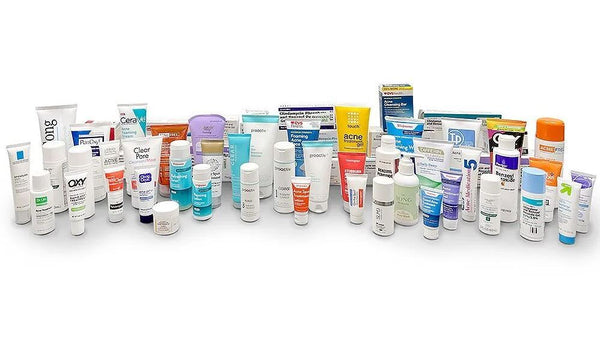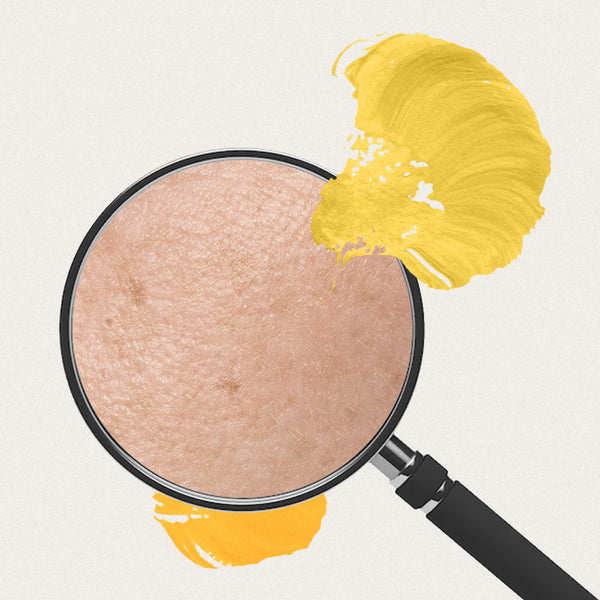There’s a tremendous amount of buzz (and valid concern) surrounding unsafe levels of benzene formation in benzoyl peroxide (BPO) products right now, following the announcement and petition for nationwide recall of benzoyl peroxide products by Valisure Laboratories. If you’re not already familiar with the issue, you can find a few excellent articles here from CNN and New Beauty:
CNN: Cancer-causing chemical can form at ‘unacceptably high levels’ in acne products
NEW BEAUTY: Benzene Has Been Found in Dozens of Acne Products: Here's what we know so far.
We’re fielding a LOT of questions about this topic right now and many inquiries about our BPO-FREE Geologie Clear System acne-treatment products - which do NOT have benzoyl peroxide - and which have been proven in clinical-testing to be just as effective in clearing acne, with far less redness, irritation and burning than BPO routines.
So…let’s get into it and answer your questions!
Topics covered in the this post:

What’s the issue with benzene and benzoyl peroxide?
Independent U.S. laboratory Valisure identified high levels of the cancer-causing chemical benzene in acne treatments containing benzoyl peroxide, including those from dozens of household names like Proactiv, Clinique, La Roche Posay, and Clearasil. The lab has petitioned the U.S. FDA to recall these products due to potential health risks. Benzene in these cases is not a result of impurities from contaminated ingredients, as seen in other products like sunscreens, but is directly attributed to benzoyl peroxide itself. Valisure's tests revealed that some products could exceed the FDA's concentration limit for benzene by more than 800 times. Moreover, benzene was not only found in the products but also in the air around them, indicating a potential inhalation risk.
What is benzene and why is it bad?
Benzene is harmful to the human body and the environment due to its carcinogenicity, toxicity, and hematotoxicity. Classified as a known human carcinogen, benzene exposure is linked to leukemia and other cancers. It damages organs and systems such as the respiratory system, liver, kidneys, immune system, and central nervous system. Moreover, it affects the bone marrow's ability to produce blood cells, leading to conditions like aplastic anemia and leukemia. Benzene also poses environmental risks as a significant air pollutant and contaminant of water and soil. So minimizing exposure to benzene is crucial for human health and environmental well-being.
Are benzene and benzoyl peroxide the same thing?
As you might guess from the name alone, the chemical composition of benzoyl peroxide is not far from pure benzene but they are not the same thing. However, the pathway for benzoyl peroxide to decompose into benzene is well known and well studied in laboratory settings.
How did benzene appear in so many products?
Knowing that benzoyl peroxide can easily decompose into benzene, the Valisure Laboratory tested over 175 acne products - both with and without benzoyl peroxide and discovered - that 94 of 99 products with benzoyl peroxide products did contain benzene, especially after exposure to temperatures comparable to what products may be exposed to in a hot room, a hot car or a hot truck transporting these products.
Do all benzoyl peroxide products contain benzene?
We don’t know. Further testing will need to be done on all products containing benzoyl peroxide to understand the magnitude of the issue and how widespread benzene exposure may be.
Are there alternatives to benzoyl peroxide for acne treatment?
Yes. Benzoyl peroxide has been a front line acne treatment for over 50 years, but many people experience a wide array of negative side effects from it, including dryness, irritation, peeling, redness, potential allergic reactions, bleaching of hair and fabrics, and increased photosensitivity.
Is a single ingredient like BPO the only way to combat acne?
BPO is considered a monotherapy - a treatment that relies on a single active ingredient. However, research has shown that combination therapies - those that incorporate multiple ingredients - can also combat acne effectively, often without the negative side effects associated with BPO. Based on this research, Geologie developed Clear System Acne Treatment specifically without benzoyl peroxide - and clinically tested it against BPO to prove that it effectively treats acne without the negative side effects of BPO (and benzene).
What is Geologie Clear System?
Clear System is a new, clinically-tested and clinically-proven acne treatment system that’s been formulated from the ground up withOUT benzoyl peroxide. Featuring 6 skin-friendly ingredients, Clear System’s patent-pending solution delivers safe, gentle and effective acne relief that makes getting (and keeping!) clear skin simple, easy and fast.
What ingredients does Clear System use instead of BPO?
Clear System features 6 safe and skin friendly ingredients that include salicylic acid, azelaic acid, niacinamide, hyaluronic acid, and retinol at 3 increasing levels of strength. In combination they form a patent-pending system that’s been clinically-proven to be just as effective as benzoyl peroxide, but without the less redness, irritation and burning and no possibility of exposure to toxic chemicals.
What were the results of the clinical study of Clear System versus BPO?
In 12 weeks of clinical testing versus benzoyl peroxide, Clear System reduced acne just as effectively as benzoyl peroxide and users reported softer and smoother skin with less redness, irritation and burning than benzoyl peroxide. In fact, in just the first 4 weeks of testing Clear System outperformed benzoyl peroxide in 78.5% of preference, performance, and tolerability measures. The 12 week double-blind Clinical study was conducted at Northwestern University Department of Dermatology to study Clear System versus 2.5% benzoyl peroxide (BPO) routine with n=21 participants with acne.
How do I know that Clear System is safe?
One of the most important findings of the rigorous, 12-week clinical study of Clear System vs BPO was that Clear System consistently, at every step of the study, produced significantly less redness, irritation and burning than benzoyl peroxide. In addition, Clear System is formulated 100% in the USA at one of the best laboratory facilities in the world, that is certified CGMP, FDA approved for cosmetic and over-the-counter (OTC) drug production and Organically Certified.
Do you even MORE questions? Let us know! We’ll continue to field your questions via all of our social channels and our amazing customer support team at help@geologie. Send in your questions and we’ll continue to build this post as a resource. We look forward to hearing from you
Dermatologically-reviewed by Dr. Steve Xu, Lead Dermatologist







